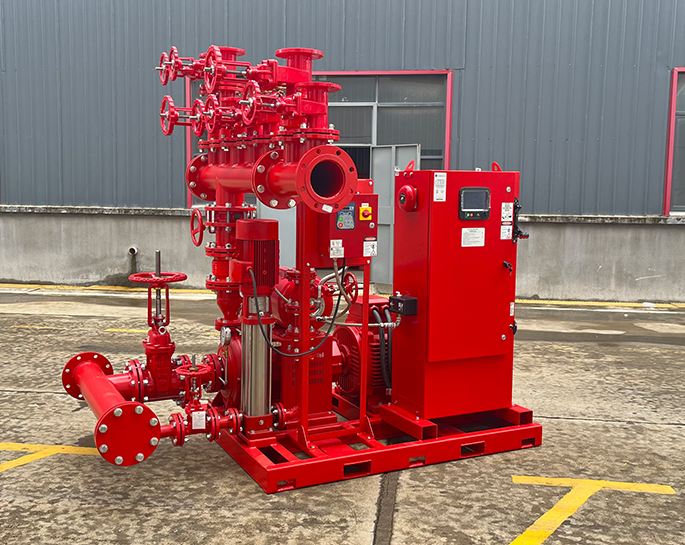What factors should be considered when selecting a diesel fire pump?
Mar 07, 2024
Share:
Selecting a diesel fire pump involves considering various factors to ensure it meets the specific requirements of the application and provides reliable performance in case of emergencies. Here are some key factors to consider:
1. **Flow Rate and Pressure Requirements**: Determine the required flow rate and pressure based on the size and layout of the facility, as well as the local fire safety regulations and standards.
2. **Pump Capacity**: Choose a pump with sufficient capacity to handle the potential fire hazard. Consider factors such as the size of the area to be protected, the type of materials present, and the potential fire risks.
3. **Reliability and Durability**: Opt for a pump that is built to withstand harsh conditions and operate reliably for extended periods. Look for pumps from reputable manufacturers with a track record of reliability and durability.
4. **Fuel Efficiency**: Diesel fire pumps should be fuel-efficient to minimize operating costs over the long term. Consider the pump's fuel consumption rate and efficiency when selecting a model.
5. **Ease of Maintenance**: Choose a pump that is easy to maintain and service. Look for features such as accessible components, user-friendly controls, and readily available spare parts.
6. **Compliance with Standards**: Ensure that the pump complies with relevant safety standards and regulations, such as NFPA (National Fire Protection Association) standards and local building codes.
7. **Installation and Integration**: Consider factors such as the space available for installation, compatibility with existing fire suppression systems, and ease of integration with other firefighting equipment.
8. **Noise Level**: Diesel pumps can generate significant noise during operation. Consider the noise level produced by the pump and ensure it meets acceptable limits for the installation location.
9. **Environmental Considerations**: Evaluate the environmental impact of the diesel pump, including emissions levels and compliance with environmental regulations.
10. **Cost**: Compare the initial cost of the pump with its long-term operating costs, including fuel consumption, maintenance, and potential downtime. Choose a pump that offers the best value for money over its entire lifespan.
By considering these factors carefully, you can select a diesel fire pump that meets your specific requirements and provides reliable fire protection for your facility. Consulting with fire safety experts and engineers can also help ensure that you choose the most suitable pump for your needs.

1. **Flow Rate and Pressure Requirements**: Determine the required flow rate and pressure based on the size and layout of the facility, as well as the local fire safety regulations and standards.
2. **Pump Capacity**: Choose a pump with sufficient capacity to handle the potential fire hazard. Consider factors such as the size of the area to be protected, the type of materials present, and the potential fire risks.
3. **Reliability and Durability**: Opt for a pump that is built to withstand harsh conditions and operate reliably for extended periods. Look for pumps from reputable manufacturers with a track record of reliability and durability.
4. **Fuel Efficiency**: Diesel fire pumps should be fuel-efficient to minimize operating costs over the long term. Consider the pump's fuel consumption rate and efficiency when selecting a model.
5. **Ease of Maintenance**: Choose a pump that is easy to maintain and service. Look for features such as accessible components, user-friendly controls, and readily available spare parts.
6. **Compliance with Standards**: Ensure that the pump complies with relevant safety standards and regulations, such as NFPA (National Fire Protection Association) standards and local building codes.
7. **Installation and Integration**: Consider factors such as the space available for installation, compatibility with existing fire suppression systems, and ease of integration with other firefighting equipment.
8. **Noise Level**: Diesel pumps can generate significant noise during operation. Consider the noise level produced by the pump and ensure it meets acceptable limits for the installation location.
9. **Environmental Considerations**: Evaluate the environmental impact of the diesel pump, including emissions levels and compliance with environmental regulations.
10. **Cost**: Compare the initial cost of the pump with its long-term operating costs, including fuel consumption, maintenance, and potential downtime. Choose a pump that offers the best value for money over its entire lifespan.
By considering these factors carefully, you can select a diesel fire pump that meets your specific requirements and provides reliable fire protection for your facility. Consulting with fire safety experts and engineers can also help ensure that you choose the most suitable pump for your needs.


.png)
.png)

.png)


